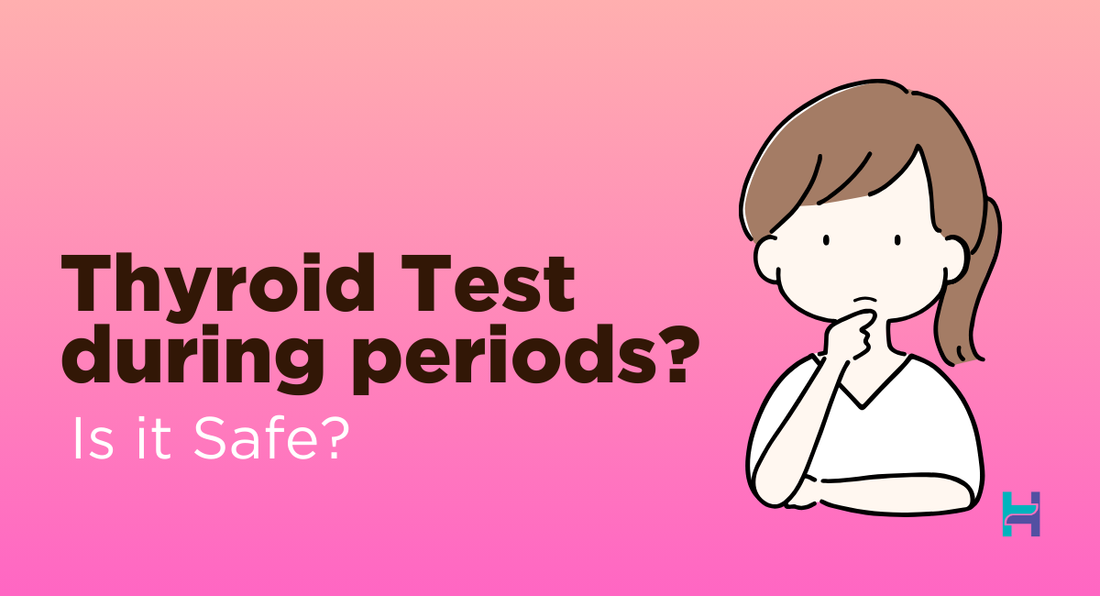We all know that thyroid health is essential for your overall well-being, affecting everything from your energy levels to mood and metabolism. But what if your test is scheduled at the time of your menstruation; should you still undergo the test and is it safe? We will be providing a brief guide in the next sections regarding taking the test during this period.
By the end, you’ll feel confident that menstruation doesn’t stand in the way of getting inaccurate thyroid results.
What is a Thyroid Test, and Why is it Important?
A thyroid test measures key hormone like TSH (Thyroid-Stimulating Hormone), T3, and T4. These hormones control some of the most essential functions in your body, such as your metabolism, mood, and energy levels. This is why it is crucial to get accurate results for the diagnosis of thyroid-related conditions such as hypothyroidism or hyperthyroidism.
Can you take a Thyroid Test During Your Period?
Yes, you can absolutely take a thyroid test during your period—it’s completely safe. A thyroid test can be done during woman's period. Your menstruation does not even affect the levels of these hormones. Hence, there are no reasons to reschedule a test for conditions such as fatigue, changes in weight, or emotional difficulties because thyroid tests can be conducted at any moment. You may go ahead with the test at any time you want it, anywhere in your menstruation cycle.
Types of Thyroid Disorders
Thyroid disorders generally fall into two main types:
- Hypothyroidism (underactive thyroid)
- Hyperthyroidism (overactive thyroid)
- Hashimoto’s Thyroiditis
Hypothyroidism: Hypothyroidism occurs when the thyroid gland doesn’t produce enough thyroid hormones, slowing down your body’s functions. This is more common in women, especially as they age. Some of the common symptoms are –
- Fatigue and feeling constantly tired
- Weight gain despite a normal or reduced appetite
- Feeling cold, even in warm environments
- Dry skin and hair loss
- Constipation and digestive issues
- Depression or mood swings
- Memory issues or brain fog
Hyperthyroidism: In this situation, your thyroid gland produces high levels of hormone, which speeds up your entire body functions. This results in various physical and mental symptoms. And these symptoms may include –
- Anxiety, irritability, or restlessness
- Sudden weight loss despite normal or increased appetite
- You may experience rapid or irregular heartbeat (palpitations)
- You may feel too warm or sweat excessively
- May feel Tremors (shaking hands or fingers)
- Muscle weakness or fatigue
- You may have irregular menstrual periods or light periods
Hashimoto’s Thyroiditis: This is an autoimmune condition where the immune system attacks the thyroid, often leading to hypothyroidism over time. Symptoms are similar to hypothyroidism (fatigue, weight gain, sensitivity to cold), Enlarged thyroid gland, Muscle weakness or joint pain.
Does Period Affect Thyroid Test Results?
No, when you are menstruating, your body undergoes natural hormonal shifts, especially in hormones such as estrogen and progesterone. But here is the reassuring part: these do not affect the thyroid hormones you have.
TSH, T3, and T4 levels do not change with any phase of your menstrual cycle. This means that whether you are on day one or day five of your cycle, your thyroid hormone levels remain the same. So, your period will not interfere with the accuracy of a thyroid test.
Is It Safe to Take a Thyroid Test During Your Period?
Yes. It is very safe. Your menstrual cycle doesn’t interfere with thyroid hormone levels like TSH, T3, or T4, so the test results will be accurate no matter the timing.
- Safe & Reliable: Menstruation doesn’t affect thyroid test results.
- Accurate Anytime: Thyroid hormone levels remain stable throughout your cycle.
- No Need to Reschedule: If you have symptoms or a scheduled test, go ahead as planned!
Things to consider while taking the test
When preparing for a thyroid test, there are a few factors to keep in mind for the most accurate results:
Fasting: Some doctors may recommend fasting for 8–12 hours before the test, as certain foods can influence hormone levels.
Your medication timing: If you're taking thyroid medication, ask your doctor if you should take it before or after the test. It may need to be temporarily paused.
What time of the day: Morning is often preferred, as TSH levels can vary throughout the day, typically peaking early.
Try to avoid certain supplements: Iron and biotin can impact test results, so avoid them 24–48 hours before your test.
These simple preparations can help ensure that your thyroid test results are as accurate as possible.
Concluding thoughts
Sometimes managing health, precisely the hormonal health, can be overwhelming during your periods. If you have fatigue, weight changes, or mood swings, a thyroid test may give you the best perception into your health. However, the test is safe, accurate, and will not be affected by your cycle.
So, you can safely proceed with your schedule as it is completely safe. Always remember to talk to your doctor about any health issues, if you have.



